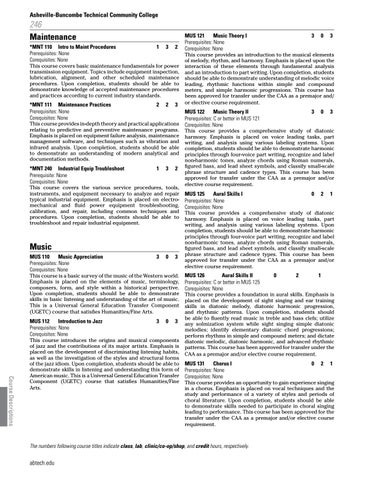Asheville-Buncombe Technical Community College
246 Maintenance *MNT 110 Intro to Maint Procedures Prerequisites: None Corequisites: None
1
*MNT 111 Maintenance Practices Prerequisites: None Corequisites: None
2
3
2
This course covers basic maintenance fundamentals for power transmission equipment. Topics include equipment inspection, lubrication, alignment, and other scheduled maintenance procedures. Upon completion, students should be able to demonstrate knowledge of accepted maintenance procedures and practices according to current industry standards.
2
3
This course provides in-depth theory and practical applications relating to predictive and preventive maintenance programs. Emphasis is placed on equipment failure analysis, maintenance management software, and techniques such as vibration and infrared analysis. Upon completion, students should be able to demonstrate an understanding of modern analytical and documentation methods.
*MNT 240 Industrial Equip Troubleshoot Prerequisite: None Corequisites: None
1
3
2
This course covers the various service procedures, tools, instruments, and equipment necessary to analyze and repair typical industrial equipment. Emphasis is placed on electromechanical and fluid power equipment troubleshooting, calibration, and repair, including common techniques and procedures. Upon completion, students should be able to troubleshoot and repair industrial equipment.
Music MUS 110 Music Appreciation Prerequisites: None Corequisites: None
3
0
3
This course is a basic survey of the music of the Western world. Emphasis is placed on the elements of music, terminology, composers, form, and style within a historical perspective. Upon completion, students should be able to demonstrate skills in basic listening and understanding of the art of music. This is a Universal General Education Transfer Component (UGETC) course that satisfies Humanities/Fine Arts.
MUS 112 Introduction to Jazz Prerequisites: None Corequisites: None
3
0
3
Course Descriptions
This course introduces the origins and musical components of jazz and the contributions of its major artists. Emphasis is placed on the development of discriminating listening habits, as well as the investigation of the styles and structural forms of the jazz idiom. Upon completion, students should be able to demonstrate skills in listening and understanding this form of American music. This is a Universal General Education Transfer Component (UGETC) course that satisfies Humanities/Fine Arts.
MUS 121 Music Theory I Prerequisites: None Corequisites: None
3
MUS 122 Music Theory II Prerequisites: C or better in MUS 121 Corequisites: None
3
MUS 125 Aural Skills I Prerequisites: None Corequisites: None
0
3
This course provides an introduction to the musical elements of melody, rhythm, and harmony. Emphasis is placed upon the interaction of these elements through fundamental analysis and an introduction to part writing. Upon completion, students should be able to demonstrate understanding of melodic voice leading, rhythmic functions within simple and compound meters, and simple harmonic progressions. This course has been approved for transfer under the CAA as a premajor and/ or elective course requirement.
0
3
This course provides a comprehensive study of diatonic harmony. Emphasis is placed on voice leading tasks, part writing, and analysis using various labeling systems. Upon completion, students should be able to demonstrate harmonic principles through four-voice part writing, recognize and label non-harmonic tones, analyze chords using Roman numerals, figured bass, and lead sheet symbols, and classify small-scale phrase structure and cadence types. This course has been approved for transfer under the CAA as a premajor and/or elective course requirement.
2
1
This course provides a comprehensive study of diatonic harmony. Emphasis is placed on voice leading tasks, part writing, and analysis using various labeling systems. Upon completion, students should be able to demonstrate harmonic principles through four-voice part writing, recognize and label non-harmonic tones, analyze chords using Roman numerals, figured bass, and lead sheet symbols, and classify small-scale phrase structure and cadence types. This course has been approved for transfer under the CAA as a premajor and/or elective course requirement.
MUS 126 Aural Skills II Prerequisites: C or better in MUS 125 Corequisites: None
0
2
1
This course provides a foundation in aural skills. Emphasis is placed on the development of sight singing and ear training skills in diatonic melody, diatonic harmonic progression, and rhythmic patterns. Upon completion, students should be able to fluently read music in treble and bass clefs; utilize any solmization system while sight singing simple diatonic melodies; identify elementary diatonic chord progressions; perform rhythms in simple and compound meters; and dictate diatonic melodic, diatonic harmonic, and advanced rhythmic patterns. This course has been approved for transfer under the CAA as a premajor and/or elective course requirement.
MUS 131 Chorus I Prerequisites: None Corequisites: None
0
2
1
This course provides an opportunity to gain experience singing in a chorus. Emphasis is placed on vocal techniques and the study and performance of a variety of styles and periods of choral literature. Upon completion, students should be able to demonstrate skills needed to participate in choral singing leading to performance. This course has been approved for the transfer under the CAA as a premajor and/or elective course requirement.
The numbers following course titles indicate class, lab, clinic/co-op/shop, and credit hours, respectively.
abtech.edu
0
